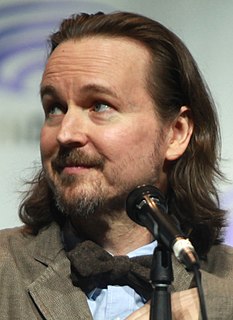Top 31 Quotes & Sayings by Matt Reeves
Explore popular quotes and sayings by an American director Matt Reeves.
Last updated on April 18, 2025.
I remember watching the Blu-ray, and also when they first released it on DVD in the collection of all three movies of 'The Godfather,' and seeing all of those scenes that they cut out, and there wasn't a single one of them that I wished they had kept it, but they were the most exciting thing to watch anyway.
When we were all kids, there was one particular trailer that I think we can all remember. That was the trailer for 'Close Encounters of the Third Kind.' There was an amazing teaser trailer with all this weird kind of documentary footage. We were like, 'What was that! I've got to see that! What the hell was that?'
It's that we're experiencing emotion through photo-real apes, and that's really holding a mirror up to who we are. It's interesting, because as we're showing the movie now, we're getting a lot of response about things [people] think are very topical. And the intention is never to approach it from the outside-in, which is to say, "Ah, this is going on, let's draw that in."
I think there's a level at which you think that there's a reason that you're being singled out, that you're being chosen. As a kid, I was always mistaken for a girl. Before you reach that age where your sexuality starts to display itself, kids can look very androgynous, and I guess I leaned more toward the feminine. All those things were very hard, growing up, because you're trying to create an identity, and you're feeling shameful about the one that you're making. So, I identified with it a lot.
There's a thing when you're always working on something you really love, and this one we loved so much, it feels like you have a secret, and you can't wait to let people in on the secret. But at the same time, there's that moment where, "What if they get the secret and they think the secret is stupid?!"
Of course you're nervous, but we're really excited to be able to share what we're going to share. And it's cool, because what we're going to be doing, I think for fans especially, we think is really cool, because part of the process that most people don't ever get to see [is] that before these movies are movies starring photo-real apes, they're movies starring the image of Andy Serkis and the other actors, who are playing apes.
What I thought was so great about Rise [of the Planet of the Apes ] was that it wasn't a retelling; it was an entering of the universe at a different point. So it's Planet of the Apes. We already know the ending. There's no mystery in that! It becomes Planet of the Apes. So it's not about what is at the end; it's about how did we get there? And that enabled something that was totally fresh, which was an ape-point-of-view movie.






















